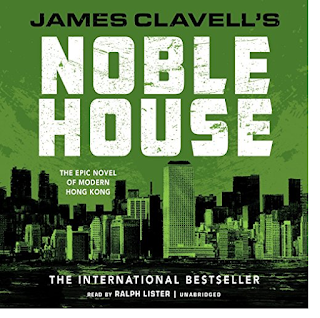No, I am not referring to any tale of Asia's past glory or prophecies of its resurgence. I am only referring to James Clavell's series of epic historic-fiction novels - Shogun, Tai-Pan, Gai-Jin, King Rat, Noble House and Whirlwind. I just finished reading Whirlwind.
While I was always curious to understand the world that lies east of India, I did not want to know or learn in a pedantic manner. On a vacation in Sikkim, I realized that the best starting point for this study was Tibet. And so, I started off with Seven Years in Tibet by Heinrich Harrer and Richard Graves. No, I did not read the book, but listened to it. I renewed my Audible subscription. Audible had introduced an Indian edition (I was paying in $$ for the international one). One of the chief reasons I hold Amazon as a company in great esteem is Audible. With Audible, I don't have to suffer the guilt of being a couch potato to consume literature. I tame the boredom of walking with the joy of listening to books.
Just after that, in a conversation, a friend suggested Shogun. And what a journey it has been since then!
Shogun transported me back in space and time to Japan's feudal, pre-Shogunate era of 1600 CE. Shogun is the classic East-meets-West (rather, West-meets-East in the narrative of its protagonist - English sailor, John Blackthorne).
The glory of the Japanese civilization, geo-politics of that era, the rivalry between sea-faring European powers, their naval adventures and escapades, the colonialism, the proselytizing ways of Christianity are all woven beautifully in the rich tapestry of Japanese landscape and mindscape. The vivid portrayal of Japan's native religious philosophy of Shinto, acceptance of Buddhism and, to a small extent, of Christianity, the Samurai code of Bushido, the chivalry of its warrior races makes one wonder about the research James Clavell has put in. For a westerner to have that level of sensitivity to understand the subtle nuances of eastern cultures and their ethos and to appreciate them is unique. The Japanese obsession with cleanliness and their open attitude to life, death and sensuality is well contrasted with Western attitudes and prudishness.
That both the Western and Eastern cultures consider and view the other culture and its people as barbarian and their own being the supreme race is brought out hilariously in all the novels in the series - the Japanese abhorred garlic-eating civilizations and the Iranians, the left-handed people! And the concept of Karma and its ways are oft brought-out lamentations in the novels' characters.
After Shogun, the scene shifts from Japan to China in Tai-Pan. This is fabulous fiction narrating the founding of Hong Kong in 1840 by clandestine China traders specializing in opium trade. It is the saga of the 'Green-eyed Devil' Dirk Struan and his company Struan & Sons and his rivalry with Tyler Brock and his Brock & Sons. The business acumen, earthy (or should it be sea-ly) common sense, political maneuvering and philandering ways of the pirate-like Chinese traders mixed with the colonial ambitions of Britain and Russia and the inscrutable ways of the Chinese makes this novel an un-put-down-able read. Interestingly, the word Tai-Pan is considered a honorable word and position by the Westerners while the Chinese only mean it in a pejorative sense!
The scene shifts back to Japan of 1862 in Gai-Jin. The Shogunate has somewhat weakened and the colonial powers are flexing their muscles. Japan feels the need to modernize and the foreigners feel the hostility. The love story of Culum Struan, the Tai-Pan of Struan and Sons in the making, is set in this backdrop.
King Rat shifts the scene to World War II (1945) and to Changi, Singapore. This is a rather tame novel only because it is set in a POW camp. Life in a prison cannot be very exciting! It has an interesting and unconventional take on morality and righteousness. The horrors of being prisoners of war and their effect on human psyche is brilliantly brought out.
The scene shifts back to Hong Kong of 1963 in Noble House. Dirk Struan's Struan & Sons has now become Noble House. It is the saga of its Tai-Pan, Ian Dunross's, handling of a hostile takeover bid from corporate raider Linc Bartlett's Par-Con Industries amidst the never-ending machinations of his arch rival, Quillan Gornt, the Tai-Pan of Rothwell-Gornt. The backdrop of full-blown Cold-War espionage, counter-espionage, double-crossing and triple-crossing agents makes it both a corporate and espionage thriller.
The last novel, Whirlwind, is not set in the East but the West of India, in Iran. Set in the Iranian revolution of 1979, it is a saga of S G Helicopters, a company secretly owned by Struans, and its tribulations amidst the upheaval triggered by the ruling Shah's escape, communist and Islamic revolutionary forces. Again, the backdrop of Cold-War espionage makes this a thriller.
In closing, The Asian Saga thoroughly entertains and educates. From Japan to Iran, James Clavell's eye for detail brings to life the bygone eras and not-so distant histories of countries, near and far, on a very rich canvas.
Why did James Clavell not write a novel set in India? Of course, the British Raj in India and its connections with Opium trade in China, the clandestine smuggling of tea seeds by the British to be cultivated in India are mentioned in his other novels, But, what is an Asian Saga without a novel set in India? Was India too complex a culture/civilization for Clavell to research or digest? Or could he not complete one? Wish I can find answers.
Now that I have finished reading (er, listening to 205 hours of) The Asian Saga, something else needs to fill the void. Will Ken Follet's Century Trilogy rise up to the occasion?





